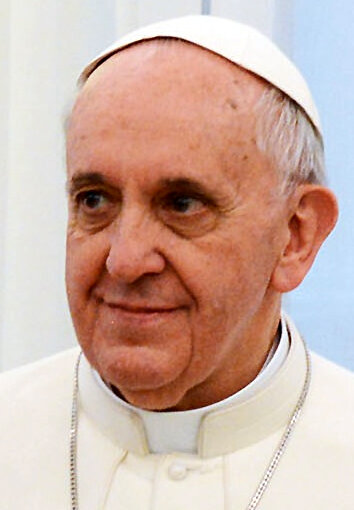The Pope, Joe Biden, and an Idealist Future
Image courtesy of Casa Rosada, via Wikimedia, ©2013, some rights reserved.
The recently released documentary “Francesco” exhibited remarks by Pope Francis regarding same-sex civil unions that marks a deviation from the previous Papal position. In the documentary, Pope Francis was heard saying “Homosexual people have a right to be in the family. They are children of God. They have a right to a family. Nobody should be thrown out of the family or made miserable over this. What we have to make is a law of civil coexistence, for they have the right to be legally covered. I stood up for that.” These remarks still seem somewhat ambiguous about the extent to which Pope Francis supports same-sex marriages. Nonetheless they have the potential to influence political discourse in nations where Catholicism remains culturally dominant.
This is particularly interesting considering that Joe Biden is now destined to become only the second Catholic president in U.S. history. He is in a unique position to reshape the political dialogue of a major Western power that has spent the past four years trying to dismantle protections for the LGBTQIA+ community. In a powerful moment in his victory speech Joe Biden said:
“And to those who supported us: I am proud of the campaign we built and ran. I am proud of the coalition we put together, the broadest and most diverse in history. Democrats, Republicans and Independents. Progressives, moderates and conservatives. Young and old. Urban, suburban and rural. Gay, straight, transgender. White Latino, Asian, Native American.”
Joe Biden has set the tone of his presidency with these words. It is a sign that this Catholic president is dedicated not only the protection of the LGBTQIA + community but the open acceptance and championship of them. The question remains, can Joe Biden and Pope Francis help set a precedent for other Catholic leaders?
Pope Francis has not changed the Catholic doctrine by any means. However, he has diminished the emphasis on sexuality as a major moral issue of our modern-day, prioritizing poverty, inequality, and climate catastrophes. While some countries like Ireland, Malta, and Colombia have accepted marriage equality, places like Russia and Poland have taken an extreme stance against LGBTQIA + rights. In Latin America, only eight out of thirty-three countries recognize gay marriage. Pope Francis’s remarks can now act as a valuable tool for activists across the world hoping to expand marriage equality.
Historically, the church’s position on social issues looms large in the U.S. Congress and governmental bodies across the world. Catholic doctrine is often used to justify legislative decision. Thus, a shift in tone from the Vatican does not exist in a vacuum. Legislative bodies who are attempting to dismantle LGBTQIA + rights will have to come to terms with the shift in Catholic leadership. With the Pope testing the waters of tolerance and the next President of the United States framing himself as a champion for all people, religious excuses for homophobic legislation will be tested.
Besides the impact on legislative bodies across the world, the Pope’s words have power for “countless queer Catholics, particularly those who are young, [who] struggle to reconcile their faith with their sexual orientation, and consequently don’t feel welcome in their churches and families.” Empowering these individuals across the world may allow for a wave of agents of change.
In a modern world, where individuals are increasingly powerful agents in the realm of international politics, a queer-friendly Catholic church may be key in extending protections for LGBTQIA + people everywhere. It is time for the international community to move past its history of intolerance and move forward to a future of acceptance and celebration of all the people in the world. If anything can be taken from the Pope’s words and the election of Joe Biden to President of the United States, it is that people have the power to change the status quo, to change the norms that dictate society, to change how we treat each other.
Tradition may be a powerful concept, but tolerance is not mutually exclusive to that ideal. Progress and tradition must find a way to coexist. While this may seem to be an idealist analysis of the Pope’s remarks and the election of a Catholic president to one of the most powerful offices in the world, the significance of these two events is in the idealism of it. Even an international analysis of should not underestimate the power of such change.




